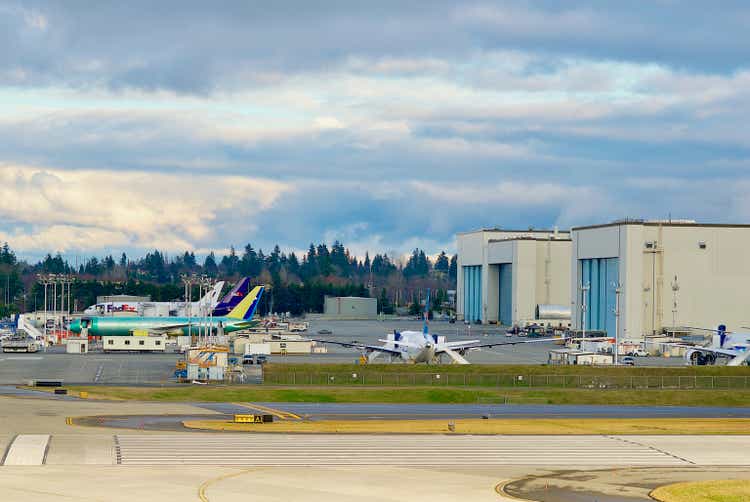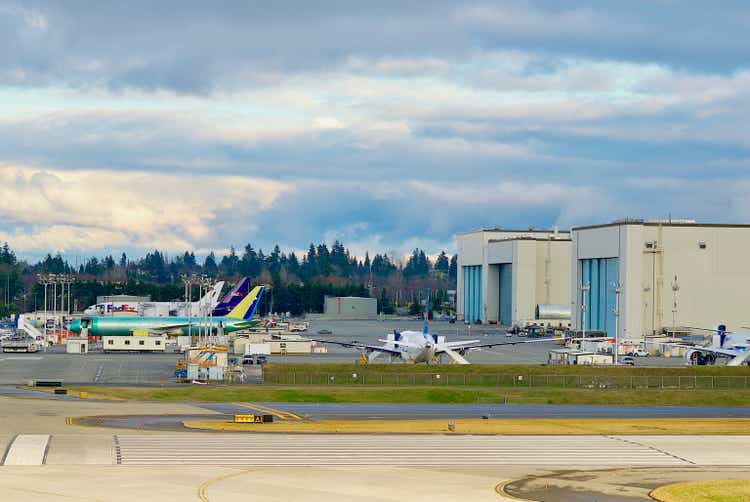
John M. Chase/iStock Unreleased via Getty Images
Boeing’s (NYSE:BA) biggest labor union went on strike on Friday, leading investors to estimate how a factory standstill for the aviation giant’s bestselling jets affects its finances. Two major variables are the eventual length of the strike and whether Boeing (BA) will agree to give union members the pay raises they seek.
A labor deal between the union’s leaders and Boeing (BA) management offered 25% wage increases over four years, less than the 40% increase demanded by workers. About 94% of the union’s members voted to reject the contract and 96% voted to go on strike, according to leaders of the 33,000-member District Lodge 751 of the International Association of Machinists and Aerospace Workers.
“The biggest point of contention we’ve heard from members is the 25% wage gain versus the initial 40% increase being sought after,” Ronald Epstein, analyst at Bank of America, said in a Sept. 13 report. “Historically, IAM 751 strikes have lasted 60 days on average.”
| Bank of America: IAM 751 & 70 strikes history at Boeing | |||
| Years | Union | Location | Total strike days |
| 1948 | IAM 751 & 70 | Seattle/Wichita | 145 |
| 1965 | IAM 751 & 71 | Seattle/Wichita | 19 |
| 1977 | IAM 751 & 72 | Seattle/Wichita | 45 |
| 1989 | IAM 751 & 73 | Seattle/Wichita | 48 |
| 1996 | IAM 751 & 74 | Seattle/Wichita | 69 |
| 2005 | IAM 751 & 75 | Seattle/Wichita | 24 |
| 2008 | IAM 751 & 76 | Seattle/Wichita | 58 |
| Average | 58 | ||
| Source: Boeing, Bank of America | |||
Before last week’s vote, members of the Boeing (BA) union had never rejected a contract recommended by its leaders. The last labor deal was in 2008, when negotiations spurred a 58-day strike that slowed production and cost the company an estimated $100 million a day.
The rejected deal would have lifted base pay this year by 11%, raising the minimum hourly rate to between $20 and $37 based on the worker’s job. The proposed contract also offered raises of 4% next year, 4% in 2026 and 6% in 2027. Boeing (BA) said average wages would rise 33% over four years with seniority increases.
Bargaining Positions
The company is bargaining from a position of weakness after recently informing suppliers that its plan to increase production of the best-selling 737 Max to 42 a month had been delayed from this month to March next year, Epstein said.
“We see it likely Boeing (BA) would have to make further concessions and move closer to the IAM’s initial proposal of 40% wage gains,” the analyst said. “An elongated strike would likely exacerbate the existing challenges. However, if the Spirit AeroSystems (SPR) strike and negotiated contract offers a precedent, the strike could be as short as a week.”
Workers at Spirit, a key supplier to Boeing (BA), last year went on strike for a week as the company and labor leaders hammered out a new four-year contract.
The almost unanimous vote by Boeing (BA) workers to reject the contract may indicate that they’re ready to dig in for a longer strike, another analyst said.
“The overwhelming nature of the vote sets up the potential for an extended work stoppage,” David Strauss, analyst at Barclays, said in a Sept. 13 report. “Assuming that Boeing (BA) does not slow down its supply chain on Max/767/777, we estimate the monthly incremental cash impact of a strike at $1 billion to $1.5 billion.”
Boeing (BA) may need to raise more money to ride out a longer work stoppage, Strauss said. Setting aside the effects of the strike, Barclays estimated that Boeing’s (BA) cash balance will fall from $12.5 billion at the end of the second quarter to $10 billion by the end of the current quarter.
Shares of Boeing (BA) touched a two-year low on Friday as the strike began, and ended the day with a 3.7% decline. The move suggests that investors already had discounted the stock for a shorter strike, according to analysts at financial-services firm Morgan Stanley.
“A short-term strike is the investor base case, while a longer-term strike will likely cause volatility in Boeing’s (BA) stock and the stocks of the supplier base,” Kristine Liwag, analyst at Morgan Stanley, said in a Sept. 13 report.
Coincidentally, Morgan Stanley hosted Boeing (BA) Chief Financial Officer Brian West at an investor conference on Friday. He said the company was working on a new contract offer to address the union’s concerns, and that the strike will “jeopardize our recovery.” West also said the company is conserving as much cash as possible.
Test for New CEO
The strike is a significant test for Boeing (BA) Chief Executive Kelly Ortberg, who started the job on Aug. 8. Ortberg spent the past week on the floor of Boeing’s (BA) factories in the Northwest, listening to employee feedback, West said.
“Kelly is personally engaged and focused on restoring trust with our people and the union,” West said. “And that’s a priority, resetting that relationship.”
Ortberg also faces the challenge of ramping up production of the 737 Max, which the Federal Aviation Administration capped after a midflight accident in January. A door plug blew out from a new 737 Max flown by Alaska Airlines, forcing an emergency landing. Aviation authorities want to see improvements to Boeing’s (BA) product quality and safety before allowing the company to increase production of the plane.
Analysts at financial-services firm UBS published three possible scenarios for Boeing (BA), depending on the length of the strike. If the work stoppage lasts a few weeks, the effect on the company’s cash will be minimal. A strike of one to two months may reduce cash by $4 billion, while a strike lasting through the end of the year would cut Boeing’s (BA) cash by $8 billion.
| UBS: Strike scenario cash impact ($ millions), Sept. 13 | |||
| Scenario A (short-lived strike of a few weeks) | Scenario B (1- to 2-month strike) | Scenario C (2+ month strike) | |
| 737 Max inventory units | 50 | 25 | 0 |
| Cash impact | – | -$563 | -$1,125 |
| 737 Max new-build | 140 | 70 | 0 |
| Cash impact | – | -$2,380 | -$4,760 |
| 777 new-build | 12 | 6 | 0 |
| Cash impact | – | -$598 | -$1,196 |
| 767 new-build | 14 | 7 | 0 |
| Cash impact | – | -$437 | -$875 |
| 787 deliveries | 34 | 34 | 34 |
| Total deliveries | 251 | 142 | 34 |
| Total cash impact | – | -$3,978 | -$7,955 |
| 2024E free cash flow | -$6,415 | -$10,392 | -$14,370 |
| Source: Company data, UBS estimates | |||
“Even with a one- to two-month strike, we see Boeing’s (BA) cash balance staying above $8 billion, though this may require a liquidity raise given the company’s target $10 billion floor,” Gavin Parsons, analyst at UBS, said in a Sept. 13 report. “Based on our conversations with investors, we believe a roughly $10 billion liquidity raise is expected.”
Cash flow is closely monitored by investors as a measure of the aviation company’s financial health and ability to reduce billions in debt needed to survive the pandemic slump.
The strike in 2008 of 58 days reduced Boeing’s (BA) free cash flow by $2.5 billion, according to analysts at financial-services firm Jefferies.
“We see this as a worst-case scenario, as new CEO Kelly Ortberg will be highly motivated to get the two parties back to the negotiating table as quickly as possible to mitigate the impact on operations,” Sheila Kahyaoglu, analyst at Jefferies, said in a Sept. 13 report.
Supply-Chain Effects
Among Boeing’s (BA) suppliers, specialty-materials company Hexcel (NYSE:HXL) and aviation parts maker Howmet Aerospace (NYSE:HWM) face risks from an extended strike, according to Morgan Stanley.
Conversely, companies that help to maintain existing planes could benefit. Those stocks include FTAI Aviation (NASDAQ:FTAI), TransDigm Group (NYSE:TDG), Heico (NYSE:HEI) and Loar Holdings (NYSE:LOAR), Morgan Stanley’s Liwag said.
The “commercial aftermarket would be a beneficiary of a prolonged Boeing (BA) strike,” she said.
